新概念英语第二册第四课完整版教案
新概念第二册4课教案

第四课an exciting trip1 exciting 令人感到Excite v.Excited 自己感到Exciting boyInteresting man The man is interesting.The news exciting,I am excited.词跟情绪有关,其宾语一定是人The news excited me. 让后面的人感到….2 receive v.Accept 同意接受Receive 客观的受到This morning I received a bunch of flowers from a boy,but I didn’t accept it.Take take the exam take adviceReceive/have receive /have a letter from somebody3 abroad adv.副词,直接和动词连用go abroad live abroad study abroad.4.firm companyAn exciting trip语调要顿挫一些Received a letter from just和完成时Months 读音前面th可省略one month two monthsI have arrived in Beijing has beenHe has been in Beijing for one yearHas been + in 地点He has been in America for two years.连读Work for 强调workWork in 强调地点I am working for a school.I am working in the new oriental school.A great number of 可数名词复数; a lot of 可数或不可数I have a great number of friends .Has gone to 去了某地没回来Has been to 曾经去过某地,现在没在那个地方Soon 很快,立刻From there 从那地方起From 既可以加时间又可以加地点from half past eight to half past eleven.From Beijing to TianjinFly to Perth: go to Perth by airBefore 副词,在此之前现在完成时态的标志Find trip exciting 宾语补主语Find + 宾语+形容词做宾补find the room cleanFind her happyIs finding I’m finding 口语中应用非常多,很生动下面表示状态,感觉,情绪,精神活动的动词不可以用于进行时Believe doubt see hear know understand belong thinkConsider feel look seem show mind have sound tasteRequire possess care like hate love detest desireArrive 不能和短时间连用现在分词表将来第三课关键句型:一般过去式第四课关键句型:现在完成时第五课:一般过去式和现在完成时的相同点,不同点,用到时候注意什么完成时标志:just before already他到某地有多久了He has been…I have been here for three years.FindFind the book dirtyFind +n.+a. 宾补(3)…a….At…..表示位置be at….典型表示位置的介词短语动词一般用be Go to 只要有to这个概念,它的后面一定要有宾语go to the theater Go in…(in做副词) 很少加宾语He went in.Go into…有去向的动作,还有进入的动作go into the roomMove 搬家move in 搬进来Move to the new house 正在搬 move into 搬进去(4)…….How long 对段时间提问,跟现在完成时相连Have+动词的过去分词第五课1 Pigeon n.It’s not my pigeon.这不是我的过错=none of my business.2 message n.Information 不可数Leave sb. A message; 给某人留便条I’ll leave you a message.Take a message for sb; 替… 捎口信Can I take a message for you?五星级的句型应用很多Can you take a message for me?3 cover v.Cover +距离;越过cover the distance.4 distance n.Distant a.Importance n. important a.Different a. difference n.Keep distance 保持距离Differences bring beauty 距离产生美中西文化:距离不能太近,离得太近时一定要先请求。
新概念英语第二册 第四课

adj. 唯一的,单一的
• Important phrases in Text Three • 1 公共花园
• 2 教我一点英语 • a public garden • teach me a little English • lend me a book • think about
• 3 借给我一本书
a great amount of(修饰不可数名词) money;
a lot of; much; a few; ☆表示许多,很多的词汇还有:____________________
许多钱:_________________________
许多书:_______________________________
次旅行非常激动人心。
迷路了,我找不到那座桥了。 We have found oil under the North Sea. 我们在北海发 现了石油。
☆重要结构: 1. ☆find+宾语+形容词做宾补:觉得…怎么样 2. find it +adj. + to do sth. 例如: find the trip exciting; find the room clean 注意,文中的句子用的是find的进行时态。 在收听外台的广播中经常能听到find不用一般式,而 用进行式。 eg: We're finding the program very exciting.
decision [diˈsi ən] ʒ
n.决定; 果断; 决议; (法院的)判决
bought [bɔ:t] v. 购买,购得( buy的过去式和过去分词 ) 够支付; 买通 spent [spent] v.用钱,花钱( spend的过去式和过去分词 ); 花费; 消耗; 花(时间) museum [mju:ˈ ziəm] n. 博物馆 public [ˈ pʌblik] adj. 公共的
drinks的英语教案
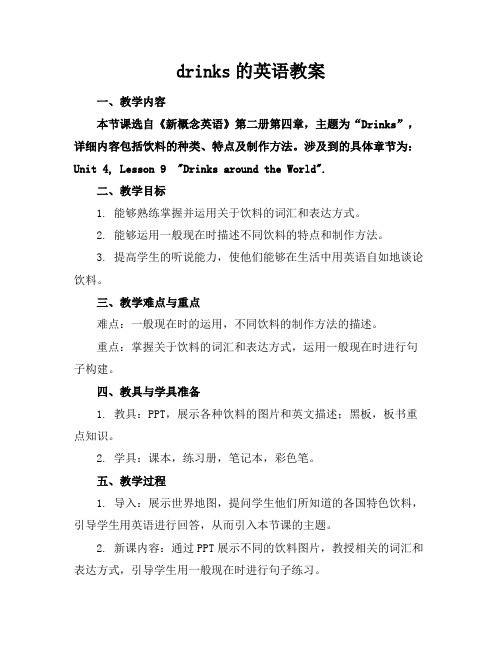
drinks的英语教案一、教学内容本节课选自《新概念英语》第二册第四章,主题为“Drinks”,详细内容包括饮料的种类、特点及制作方法。
涉及到的具体章节为:Unit 4, Lesson 9 "Drinks around the World".二、教学目标1. 能够熟练掌握并运用关于饮料的词汇和表达方式。
2. 能够运用一般现在时描述不同饮料的特点和制作方法。
3. 提高学生的听说能力,使他们能够在生活中用英语自如地谈论饮料。
三、教学难点与重点难点:一般现在时的运用,不同饮料的制作方法的描述。
重点:掌握关于饮料的词汇和表达方式,运用一般现在时进行句子构建。
四、教具与学具准备1. 教具:PPT,展示各种饮料的图片和英文描述;黑板,板书重点知识。
2. 学具:课本,练习册,笔记本,彩色笔。
五、教学过程1. 导入:展示世界地图,提问学生他们所知道的各国特色饮料,引导学生用英语进行回答,从而引入本节课的主题。
2. 新课内容:通过PPT展示不同的饮料图片,教授相关的词汇和表达方式,引导学生用一般现在时进行句子练习。
a. 教授词汇:coffee, tea, cola, juice, smoothie, cocktail, ingredients, recipe等。
b. 句子练习:e.g. Coffee is made from coffee beans.Tea has many health benefits.3. 例题讲解:以制作咖啡为例,详细讲解一般现在时的运用,并让学生模仿例句进行练习。
4. 随堂练习:分组进行角色扮演,每组选择一种饮料,用英语描述其特点和制作方法,其他组员进行猜测。
六、板书设计1. Drinks2. 重点词汇:coffee, tea, cola, juice, smoothie, cocktail, ingredients, recipe等。
3. 重点句型:e.g. Coffee is made from coffee beans. Tea has many health benefits.七、作业设计1. 作业题目:Write a short passage about your favorite drink, including its ingredients, benefits and how to make it.2. 答案示例:My favorite drink is green tea. It is made from the leaves of a plant called Camellia sinensis. Green tea hasmany health benefits, such as reducing stress and improving heart health. To make green tea, you need to boil water, then steep the tea leaves in the hot water for about 35 minutes. Finally, you can enjoy the refreshing taste of green tea.八、课后反思及拓展延伸本节课通过实践情景引入,让学生在轻松愉快的氛围中学习关于饮料的英语表达。
新概念英语2册4课Lesson4(详解)
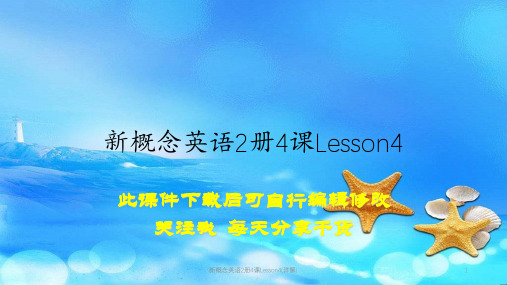
__d_e_ci_sioI ndid not write ae_a_rl_y____ card!bought
spent
whole
but
single 新概念英语2册4课Lesson4(详解)
4
New words
exciting adj. 令人兴奋的(修饰事物)
excited 感到兴奋的(修饰人)
-ed自己感到 interested, bored, relaxed -ing令人感到interesting,boring,relaxing
新概念英语2册4课Lesson4(详解)
10
New Lesson
An exciting trip
I have just received a letter from my brother,
Tim. He is in Australia. He has been there for
six months. Tim is an engineer. He is working
同义 accept同意,接受(主观)
e.g. This morning I received a bunch of
flowers but I didn’t accept it. take接受,收到
e.g. take the exam, take advice
新概念英语2册4课Lesson4(详解)
6
新概念英语2册4课Lesson4
此课件下载后可自行编辑修改 关注我 每天分享干货
新概念英语2册4课Lesson4(详解)
1
key points
I.Key words exciting, receive, firm, different…
新概念英语第二册 第四课
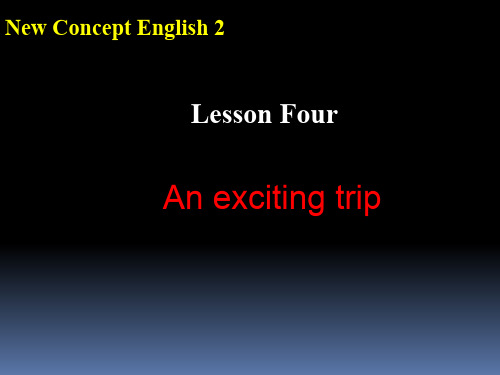
bought [bɔ:t] v. 购买,购得( buy的过去式和过去分词 )
够支付; 买通 spent [spent]
v.用钱,花钱( spend的过去式和过去分词 ); 花费; 消耗; 花(时间) museum [mju:ˈziəm] n. 博物馆 public [ˈpʌblik] adj. 公共的
呆在床上不起来___st_a_y_i_n_b_e_d___ 直到___u_n_ti_l _______ 起床早__g_e_t_u_p_e_a_rl_y___ 起床晚___g_et_u_p__la_te____ 向窗外看__lo_o_k_o_u_t_o_f_th_e__window 重复___r_e_p_ea_t______ 外面__o_u_t_si_d_e______ (铃、电话等)响___ri_n_g________
private conversation theatre seat play loudly
私人的 谈话 剧场,戏院 座位 戏 大声地
angry angrily attention bear business rudely
生气的 生气地 注意 容忍 事 无礼地,粗鲁地
A. New words (in Lesson Two)
教书; 训练; 教育
Italian [ɪˈtæljən] n.意大利人; 意大利语; 意大利国民 adj.意大利的; 意大利人的; 意大利语的;
thought [θɔ:t] v.想( think的过去式和过去分词); 思索; 以为; 认为
decision [diˈsiʒən] n.决定; 果断; 决议; (法院的)判决
friendly [ˈfrendli] adj. waiter [ˈweitə] n. lend [lend] v. decision [diˈsiʒən] n. whole [həul] adj. single [ˈsiŋɡl] adj.
新概念第二册第4课教案

Unit 4 An Exciting TripTeaching objects: junior high school studentsTeaching aims:teach Ss present perfect tense and find + sth. + adj. structure through reading and listening so that they could use them to describe theevents that they have experiencedTeaching content: An Exciting TripImportant points: exciting, receive a letter, go/live abroad, engineer; work for/in/atHave gone/been to, find sth. exciting/interesting/disappointing/adj.Difficult points: present perfect tense, find sth. adj.Teaching method:communicative approachTeaching design:Warming-up: listen to students' summer holiday life (have you been to some places of interests)—students give some short description of the tourist attraction and his feelings about the trip.Step 1:Pre-reading:(1)介绍课文背景:作者收到brother Tim的来信,信中讲述了Tim的旅行计划。
(2)学生想象图片里的故事Step 2. While-reading: 先讲解课文,在这过程中讲述一些重点词汇和语法点。
(完整版)新概念英语第二册第四课完整版教案
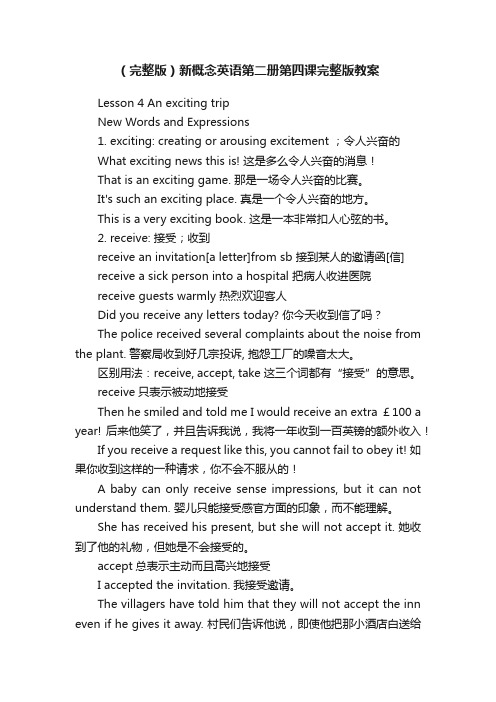
(完整版)新概念英语第二册第四课完整版教案Lesson 4 An exciting tripNew Words and Expressions1. exciting: creating or arousing excitement ;令人兴奋的What exciting news this is! 这是多么令人兴奋的消息!That is an exciting game. 那是一场令人兴奋的比赛。
It's such an exciting place. 真是一个令人兴奋的地方。
This is a very exciting book. 这是一本非常扣人心弦的书。
2. receive: 接受;收到receive an invitation[a letter]from sb 接到某人的邀请函[信]receive a sick person into a hospital 把病人收进医院receive guests warmly 热烈欢迎客人Did you receive any letters today? 你今天收到信了吗?The police received several complaints about the noise from the plant. 警察局收到好几宗投诉, 抱怨工厂的噪音太大。
区别用法:receive, accept, take这三个词都有“接受”的意思。
receive只表示被动地接受Then he smiled and told me I would receive an extra £100 a year! 后来他笑了,并且告诉我说,我将一年收到一百英镑的额外收入!If you receive a request like this, you cannot fail to obey it! 如果你收到这样的一种请求,你不会不服从的!A baby can only receive sense impressions, but it can not understand them. 婴儿只能接受感官方面的印象,而不能理解。
2024年英语Whatcolourisit教学教案

2024年英语What colour is it教学教案一、教学内容本节课选自《新概念英语》第二册第四章,详细内容为“Colour Review”部分。
主要学习各种颜色单词,如red、blue、green、yellow等,并通过句型“What colour is it?”进行颜色问答。
二、教学目标1. 让学生掌握基本的颜色单词,并能熟练运用。
2. 学会使用句型“What colour is it?”进行颜色问答。
3. 培养学生的口语表达能力,提高英语学习兴趣。
三、教学难点与重点1. 教学难点:颜色单词的发音及拼写。
2. 教学重点:句型“What colour is it?”的运用。
四、教具与学具准备1. 教具:PPT、彩色图片、单词卡片。
2. 学具:课本、练习本、彩色笔。
五、教学过程1. 导入:通过展示一组彩色图片,引导学生说出图片中的颜色,引入本节课的主题。
2. 新课内容:学习颜色单词,如red、blue、green、yellow等,并进行句型练习。
a. 教师展示单词卡片,引导学生跟读。
b. 学生两人一组,用句型“What colour is it?”进行颜色问答。
c. 教师挑选几组学生进行展示,给予鼓励和指导。
3. 实践情景引入:请一位学生扮演售货员,其他学生扮演顾客,进行颜色问答练习。
4. 例题讲解:通过PPT展示例题,讲解句型“What colour is it?”的用法。
5. 随堂练习:发放练习纸,让学生完成颜色单词填空和句型练习。
六、板书设计1. 颜色单词:red、blue、green、yellow等。
2. 句型:“What colour is it?”七、作业设计1. 作业题目:完成练习册中关于颜色单词和句型的练习。
答案:见练习册答案。
2. 拓展延伸:收集生活中的颜色物品,用英语介绍给家人或朋友。
八、课后反思及拓展延伸1. 反思:本节课通过丰富的实践活动,提高了学生的口语表达能力。
新概念英语第二册Lesson4
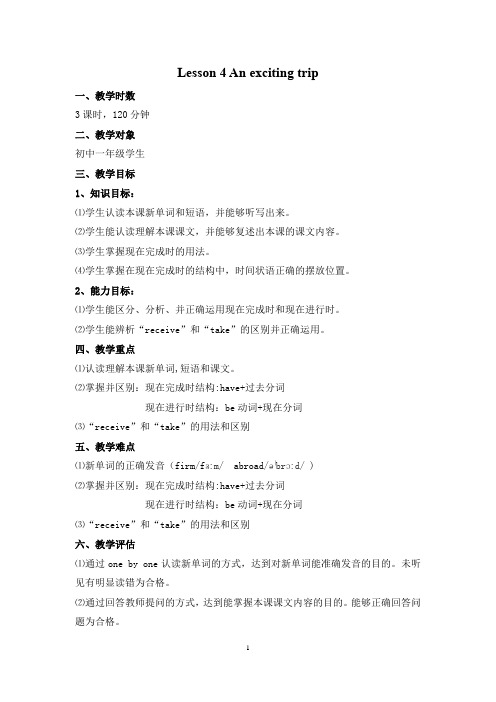
Lesson 4 An exciting trip一、教学时数3课时,120分钟二、教学对象初中一年级学生三、教学目标1、知识目标:⑴学生认读本课新单词和短语,并能够听写出来。
⑵学生能认读理解本课课文,并能够复述出本课的课文内容。
⑶学生掌握现在完成时的用法。
⑷学生掌握在现在完成时的结构中,时间状语正确的摆放位置。
2、能力目标:⑴学生能区分、分析、并正确运用现在完成时和现在进行时。
⑵学生能辨析“receive”和“take”的区别并正确运用。
四、教学重点⑴认读理解本课新单词,短语和课文。
⑵掌握并区别:现在完成时结构:have+过去分词现在进行时结构:be动词+现在分词⑶“receive”和“take”的用法和区别五、教学难点⑴新单词的正确发音(firm/fɜ:m/ abroad/əˈbrɔ:d/ )⑵掌握并区别:现在完成时结构:have+过去分词现在进行时结构:be动词+现在分词⑶“receive”和“take”的用法和区别六、教学评估⑴通过one by one认读新单词的方式,达到对新单词能准确发音的目的。
未听见有明显读错为合格。
⑵通过回答教师提问的方式,达到能掌握本课课文内容的目的。
能够正确回答问题为合格。
⑶通过教师说中文意思,学生回答英文单词的方式。
达到能准确说出新单词及记忆其中文意思的目的。
能够正确说出相应的英文单词为合格。
七、教学资源教材《NCE-2》、音频、视频、单词卡片、QUIZ八、教学步骤步骤一:热身导入⑴背诵Lesson3课文。
⑵听写Lesson3单词和短语。
⑶检查并点评Lesson3摘要写作。
⑷检查并讲解Lesson3课后习题。
⑸复习双宾句,教师讲解复习20个双宾动词。
(lend,send,pay,hand,bring,sell,find,show,promise,give,leave,teach,offer,read,order,owe,pass,do,spend,make)⑹听写五组双宾句。
新概念英语第二册第四课讲解

新概念英语第二册第四课讲解Lesson 4 An exciting trip激动人心的旅行I have just received a letter from my brother, Tim. He is in Australia. He has been there for six months. Tim is an engineer. He is working for a big firm and he has already visited a great number of different places in Australia. He has just bought an Australian car and has gone to Alice Springs, a small town in the centre of Australia. He will soon visit Darwin. From there, he will fly to Perth. My brother has never been abroad before, so he is finding this trip very exciting.New words and expressions 生词和短语exciting adj. 令人兴奋的receive v. 接受,收到firm n. 商行,公司different adj. 不同的centre n. 中心abroad adv. 在国外Darwin ['dɑrw?n]参考译文我刚刚收到弟弟蒂姆的来信,他正在澳大利亚。
他在那儿已经住了6个月了。
蒂姆是个工程师,正在一家大公司工作,并且已经去过澳大利亚的不少地方了。
他刚买了一辆澳大利亚小汽车,现在去了澳大利亚中部的小镇艾利斯斯普林斯。
他不久还将到达达尔文去,从那里,他再飞往珀斯。
我弟弟以前从未出过国,因此,他觉得这次旅行非常激动人心。
04月08日新概念二第四课教案
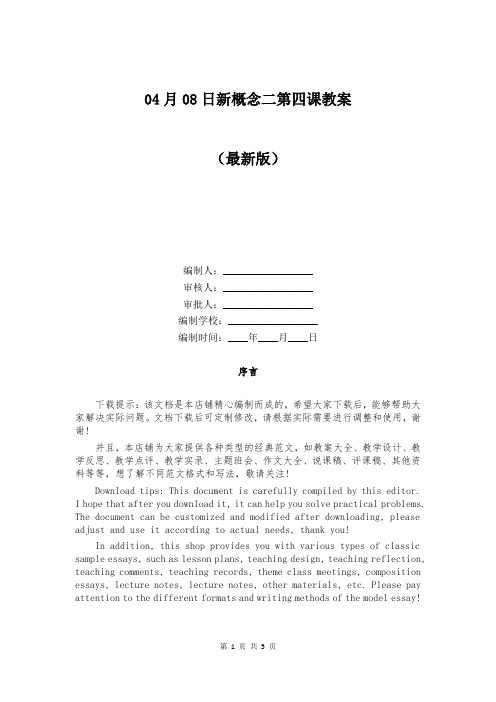
04月08日新概念二第四课教案(最新版)编制人:__________________审核人:__________________审批人:__________________编制学校:__________________编制时间:____年____月____日序言下载提示:该文档是本店铺精心编制而成的,希望大家下载后,能够帮助大家解决实际问题。
文档下载后可定制修改,请根据实际需要进行调整和使用,谢谢!并且,本店铺为大家提供各种类型的经典范文,如教案大全、教学设计、教学反思、教学点评、教学实录、主题班会、作文大全、说课稿、评课稿、其他资料等等,想了解不同范文格式和写法,敬请关注!Download tips: This document is carefully compiled by this editor.I hope that after you download it, it can help you solve practical problems. The document can be customized and modified after downloading, please adjust and use it according to actual needs, thank you!In addition, this shop provides you with various types of classic sample essays, such as lesson plans, teaching design, teaching reflection, teaching comments, teaching records, theme class meetings, composition essays, lecture notes, lecture notes, other materials, etc. Please pay attention to the different formats and writing methods of the model essay!04月08日新概念二第四课教案Lesson 4 An exciting trip 激动人心的旅行NEW WORDS AND EXPRESSIONSexciting adj. 令人兴奋的excite:激动excited:-ed: 自己感到-ing:令人感到exciting boy interesting man The man is interesting. The news exciting,I am excited 其宾语一定是人 The news excited me. 让后面的人感到... interesting:令人感到有趣的 interested: 感到有意思的 The book interests me. receive v. 接受,收到accept:同意接收 receive:客观的收到 This morning I received a bunch of flowers from a boy,but I didn't acceptit. take take the exam:接收考试;take advice接收建议 receive/have receive/have a letter from somebody. firm n. 商行,公司company different adj. 不同的 centre n. 中心 abroad adv. 在国外副词,直接和动词连用 go aroad live abroad study abroad【Text】I have just received a letter from my brother, Tim. He is in Australia.He has been there for six months. Tim is an engineer.He is working for a big firm andhe has already visited a great number of different places in Australia.He has just bought an Australian car and has gone to Alice springs,a small town in the centre of Australia. He will soon visit Darwin.From there, he will fly to Perth. My brother has never been abroad before,so he is fending this trip very exciting. 参考译文我刚刚收到弟弟蒂姆的来信,他正在澳大利亚。
myroom我的房间英语学习教案

my room我的房间英语学习教案一、教学内容本节课选自《新概念英语》第二册第四章,详细内容为“my room 我的房间”。
通过该章节的学习,学生将掌握描述房间布局、家具及物品的词汇和句型。
二、教学目标1. 能够听懂并运用关于房间布局、家具及物品的词汇。
2. 能够用英语描述自己的房间,并进行简单介绍。
3. 提高学生的英语口语表达能力和听力理解能力。
三、教学难点与重点难点:正确使用描述房间布局、家具及物品的词汇和句型。
重点:听懂并运用词汇描述房间,进行简单的英语介绍。
四、教具与学具准备1. 教具:PPT、图片、录音机、磁带。
2. 学具:英语课本、练习本、彩笔。
五、教学过程1. 导入:展示一张房间的图片,引导学生用中文描述房间,然后提出问题:“How to describe the room in English?”引发学生思考。
2. 呈现:播放录音,让学生听并跟读关于房间的词汇和句型,同时展示PPT,呈现词汇和句型的书写形式。
3. 实践:分组活动,每组学生用所学的词汇和句型描述自己的房间,并进行角色扮演。
4. 互动:邀请学生上台展示,其他学生认真听并给予评价,教师进行点评和指导。
5. 巩固:进行随堂练习,让学生根据所给词汇和句型完成练习题目。
六、板书设计1. My Room2. 主要词汇:bedroom, living room, kitchen, bathroom, bed, sofa, table, chair, TV, wardrobe, window, floor, wall,ceiling3. 主要句型:This is my room.There is a bed in my bedroom.The living room has a TV and a sofa.The table is next to the window.七、作业设计1. 作业题目:(1)用所学的词汇和句型描述自己的房间,不少于50词。
新概念2第4课教案

Lesson 4 An exciting tripI have just received a letter from my brother, Tim. He is in Australia. He has been there for six months. Tim is an engineer. He is working for a big firm and he has already visited a great number of different places in Australia. He has just bought an Australian car and has gone to Alice Springs, a small town in the centre of Australia. He will soon visit Darwin From there, he will fly to Perth. My brother has never been abroad before, so he is finding this trip very exciting. Listening Practice.I have just received a letter from my _______, Tim. He is in Australia. He has been there for six months. Tim is an engineer. He is working for a big firm and he has already visited a great number of different places in Australia. He has just bought an Australian ______ and has gone to Alice Springs, a small ______ in the centre of Australia. He will soon visit Darwin. From there, he will fly to Perth. My brother has never been abroad before, so he is finding this trip very _______. Shadow PracticeWord PracticeFind out words you don ’t know.令人兴奋的_________________接受;收到________________商行;公司__________________ 不同的__________________中心__________________在国外__________________ Phrase Practice一次激动人心的旅行___________________________收到一封来自...的信___________________________在澳大利亚___________________________长达六个月___________________________一名工程师_________________________为...而工作___________________________一个大公司_______________________许多_______________________去了某地(去了未回)_________________________在...中心___________________________坐飞机去某地___________________去过某地(去了已回)_________________________发现这次旅行很令人激动___________________________Tense PracticeFind out the present perfect tense and transform the present perfect tense into original formSentence PracticeTranslate the sentences.我刚刚收到一封来自我弟弟Tim的信。
新概念第二册第4课课件教学文案

Most backpackers prefer to travel on their own to enjoy his or her solitary life.
You can also travel with your true friends.
Self-driving travel is another good choice.
Honeymoon travel
How romantic!
Do careful preparations
Tour route Weather Time plan Map Hotel Possible expenses Cultures security ……
Today we’ll listen to a story about a trip to
Let’s go travelling
group travel backpack travel self-driving travel
Group travel
In China, it is the most common way of travelling. When it comes to travelling, most Chinese people will go to a travel agency first. In a travel agency you can find a lot of travel information, the only thing you need to do is to choose a travel group to sign up for. Then go home to do the packings.
advantages
完整版Animals动物英语课件
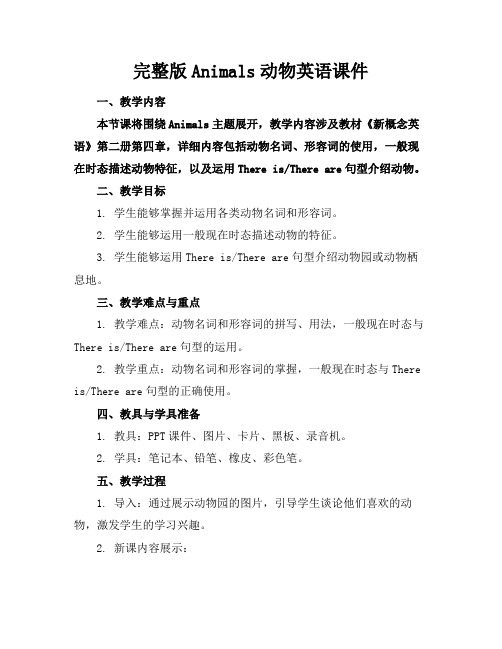
完整版Animals动物英语课件一、教学内容本节课将围绕Animals主题展开,教学内容涉及教材《新概念英语》第二册第四章,详细内容包括动物名词、形容词的使用,一般现在时态描述动物特征,以及运用There is/There are句型介绍动物。
二、教学目标1. 学生能够掌握并运用各类动物名词和形容词。
2. 学生能够运用一般现在时态描述动物的特征。
3. 学生能够运用There is/There are句型介绍动物园或动物栖息地。
三、教学难点与重点1. 教学难点:动物名词和形容词的拼写、用法,一般现在时态与There is/There are句型的运用。
2. 教学重点:动物名词和形容词的掌握,一般现在时态与There is/There are句型的正确使用。
四、教具与学具准备1. 教具:PPT课件、图片、卡片、黑板、录音机。
2. 学具:笔记本、铅笔、橡皮、彩色笔。
五、教学过程1. 导入:通过展示动物园的图片,引导学生谈论他们喜欢的动物,激发学生的学习兴趣。
2. 新课内容展示:a. 教师展示PPT,呈现各类动物的图片,引导学生学习动物名词和形容词。
b. 教师通过例句,引导学生学习一般现在时态描述动物特征。
c. 教师通过PPT,展示There is/There are句型的用法,并举例说明。
3. 实践环节:a. 学生分组,根据所给动物名词和形容词,用一般现在时态描述动物特征。
b. 学生运用There is/There are句型,介绍动物园或动物栖息地。
4. 例题讲解:a. 教师给出例句,如:There is a lion in the zoo. The lion is strong.b. 教师对例句进行讲解,指导学生正确使用动物名词、形容词、一般现在时态和There is/There are句型。
5. 随堂练习:a. 学生根据所学内容,完成练习册上的相关题目。
b. 教师对练习进行讲解,纠正学生的错误。
新概念英语第二册Lesson4教案
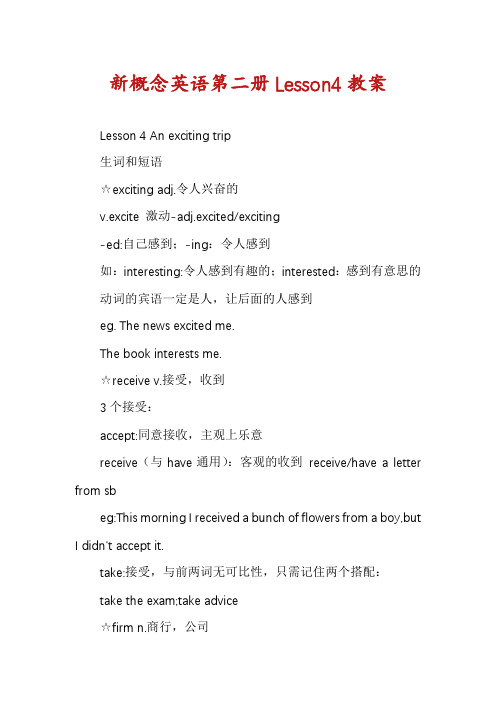
新概念英语第二册Lesson4教案Lesson 4 An exciting trip生词和短语☆exciting adj.令人兴奋的v.excite 激动-adj.excited/exciting-ed:自己感到;-ing:令人感到如:interesting:令人感到有趣的;interested:感到有意思的动词的宾语一定是人,让后面的人感到eg. The news excited me.The book interests me.☆receive v.接受,收到3个接受:accept:同意接收,主观上乐意receive(与have通用):客观的收到receive/have a letter from sbeg:This morning I received a bunch of flowers from a boy,but I didn't accept it.take:接受,与前两词无可比性,只需记住两个搭配:take the exam;take advice☆firm n.商行,公司等同于company☆abroad adv.在国外注意是个副词,直接和动词连用,不需要介词go/live/study abroad☆have been+in 地点他已经到北京了:He has arrived in Beijing.他到北京一年了,就不能用arrive了。
因为arrive是表示点的动词,不能和段时间连用。
所以用我们的新句型:have been in 地点He has been in Beijing for one year.☆work in 强调工作的地点work for 强调work,不是在游逛,是在工作☆a great number of后面一定要加可数名词复数a lot of可加可数名词也可加不可数名词它们是约等于的关系I have a lot of/a great number of friends.I have a lot of time.中的 a lot of 就不能替换为 a great number of了☆have gone to :去了某地没回来have been to :曾经去过某地,现在不在那个地方☆from there:从那地方起from既可以加时间又可以加地点eg. from half past 8 to half past 11from Beijing to Tianjin☆fly to Perth=go to Perth by air☆before用在句子的末尾是副词,翻译为“在此之前”,是现在完成时态的标志。
- 1、下载文档前请自行甄别文档内容的完整性,平台不提供额外的编辑、内容补充、找答案等附加服务。
- 2、"仅部分预览"的文档,不可在线预览部分如存在完整性等问题,可反馈申请退款(可完整预览的文档不适用该条件!)。
- 3、如文档侵犯您的权益,请联系客服反馈,我们会尽快为您处理(人工客服工作时间:9:00-18:30)。
Lesson 4 An exciting tripNew Words and Expressions1. exciting: creating or arousing excitement ;令人兴奋的What exciting news this is! 这是多么令人兴奋的消息!That is an exciting game. 那是一场令人兴奋的比赛。
It's such an exciting place. 真是一个令人兴奋的地方。
This is a very exciting book. 这是一本非常扣人心弦的书。
2. receive: 接受;收到receive an invitation[a letter]from sb 接到某人的邀请函[信]receive a sick person into a hospital 把病人收进医院receive guests warmly 热烈欢迎客人Did you receive any letters today? 你今天收到信了吗?The police received several complaints about the noise from the plant. 警察局收到好几宗投诉, 抱怨工厂的噪音太大。
区别用法:receive, accept, take这三个词都有“接受”的意思。
receive只表示被动地接受Then he smiled and told me I would receive an extra £100 a year! 后来他笑了,并且告诉我说,我将一年收到一百英镑的额外收入!If you receive a request like this, you cannot fail to obey it! 如果你收到这样的一种请求,你不会不服从的!A baby can only receive sense impressions, but it can not understand them. 婴儿只能接受感官方面的印象,而不能理解。
She has received his present, but she will not accept it. 她收到了他的礼物,但她是不会接受的。
accept总表示主动而且高兴地接受I accepted the invitation. 我接受邀请。
The villagers have told him that they will not accept the inn even if he gives it away. 村民们告诉他说,即使他把那小酒店白送给人家,也没有人会接受的。
There is no accepted theory to explain the phenomenon. 没有公认的理论来解释这种现象。
take所表示的接受包含着有人赠给的意思Did you take his advice? 你接受了他的建议了吗?He takes anything he is given. 给他什么他就要什么。
Is there nobody to take my instructions? 难到没有人接受我的指令吗?3. firm: n. n. 商行;公司trading firms 贸易行He has established his own firm. 他已建立起自己的公司。
adj 坚牢的,坚固的You must always build on firm ground. 你必须始终脚踏实地。
Mother kept a firm hold on her son's hands as he said goodbye to her abroad. 儿子向母亲告别到国外去时,母亲紧紧地拉住他的双手。
(2) 稳定的;坚定的a firm belief 坚定的信念Prices are still firm. 物价仍然稳定。
The teacher was firm and did not change her mind. 老师很坚决,他不改变主意。
The pound stayed firm against dollar in London but fell a little in New York. 伦敦英镑对美元仍坚挺,但在纽约却跌了一点儿。
Parents must be firm with their children. 父母对孩子一定要严格。
联想: company公司,商号We organized a publishing company. 我们组织一出版公司。
4. center: n. 中心the center of town 市中心the center of a stage舞台中心a medical center 医疗中心a metropolitan center 大都市中心cultural center 文化中心The sun is the center of our solar system. 太阳是太阳系的中心。
Beijing is the political and financial center of China. 北京是中国的政治和金融中心。
经典用法:in the center of: 在中间, 在中央=in the middle of5. abroad: adv. 在国外, 到海外; 在室外; 广泛地; 遍布; 流行; 到处传开;get abroad 出去, 出门; (谣言)传出去, 传开go [travel] abroad 到国外去live abroad 住在国外at home and abroad 在国内外agency abroad 国外代办处income earned abroad 国外收入investment abroad 国外投资market abroad 海外市场representative abroad 国外代表student studying abroad 留学生He lived abroad for many years. 他在国外居住了许多年。
She is hungry for news of her husband working abroad. 她渴望得到国外工作的丈夫的消息。
Many people would like to take holidays abroad. 许多人愿意到国外度假。
He came to miss his homeland when he settled down abroad. 当他在国外安定下来时,他开始想念祖国了。
The news spread abroad. 消息传得很广。
A rumour is abroad. 谣言在传开。
经典用法:from abroad 从国外, 从海外The conference delegates included representatives from abroad. 大会代表中有来自海外的代表。
6. a (great) number of: “许多”,修饰可数名词的复数a great amount of:“许多”修饰不可数名词During the past 20 years, a great number of power stations have been set up. 在过去的二十年间, 兴建了许多电站。
A number of people complained about the poor lighting in the museum. 那群人的人数并不多。
许多人抱怨博物馆照明不好。
a great amount of intelligence 非常聪明A large amount of money is spent on advertisements every year. 每年都要花费大量金钱在广告上。
比较:a number of / the number ofA number of the workers are unskilled. 许多工人技术不熟练。
The number of skilled workers is small. 熟练工人数较少。
The amount of unemployed capital is very large. 未被利用的资金数量很大。
7. My brother has never been there before, so he is finding this trip very exciting.find: (1) 找到If you find any mistake, please correct it. 如发现有错, 请你改正。
I think I'm lost; I can't find the bridge. 我想我是迷路了,我找不到那座桥了。
The aim is to find meaning and enjoyment in work. 其目的是从工作中发现意义, 找到乐趣。
(2) 发现,发觉find it difficult to explain 觉得难以说明I find Russian grammar very difficult. 我发现俄语语法很难学。
I found him at home. 我发现他在家。
常用词组:find out 发现;揭露I've found you out at last. 我终于把你揭露了。
Please find out when the ship sails for New York. 请打听一下那艘船什么时候开往纽约。
Please find out what time the delegation will come. 请查一查代表团什么时候来。
【Text】I have just received a letter from my brother, Tim. He is in Australia. He has been there for six months. Tim is an engineer. He is working for a big firm and he has already visited a great number of different places in Australia. He has just bought an Australian car and has gone to Alice springs, a small town in the centre of Australia. He will soon visit Darwin. From there, he will fly to Perth. My brother has never been abroad before, so he is finding this trip very exciting.参考译文:我刚刚收到弟弟蒂姆的来信, 他正在澳大利亚. 他在那儿已经住了6个月了. 蒂姆是个工程师, 正在一家大公司工作, 并且已经去过澳大利亚的不少地方了. 他刚买了一辆澳大利亚小汽车, 现在去了澳大利亚中部的小镇艾利斯斯普林斯. 他不久还将到达达尔文去, 从那里, 他再飞往珀斯. 我弟弟以前从未出过国,因此, 他觉得这次旅行非常激动人心.。
